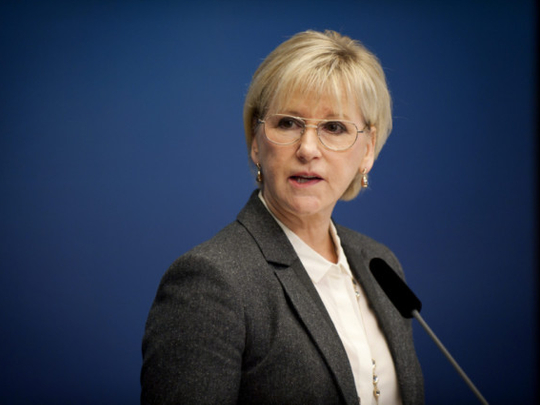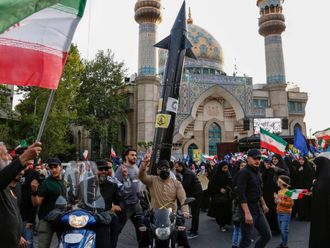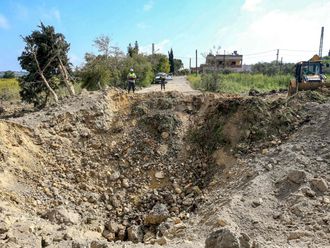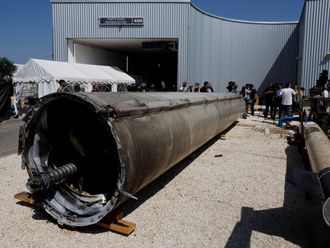
Dubai: Sweden on Thursday became the first member of the European Union (EU) to officially recognise the state of Palestine.
The move, which comes less than a month after the announcement of the new left-wing government in Sweden, aims to revive peace talks between the Palestinians and Israelis, Swedish Foreign Minister Margot Wallstrom told Gulf News in an interview.
“First of all, we think that it is important to try to inject new energy into the suspended peace negotiations,” she said.
“We see that the most important step for the future is, of course, to have a negotiated two-state solution, and we think that this will help to make the parties more equal.”
“I also think that this will hopefully give young people more hope for the future in that we give the moderate Palestinians our support and our backing. We can see that there is a move towards the radicalisation of young people both in Israel and Palestine,” she added.
Earlier in October, the Swedish Prime Minister Stefan Lofven, from the Social Democratic Party, said in his inauguration speech that the solution to the Palestinian-Israeli conflict lay through a two-state solution, negotiated in accordance with international law.
“A two-state solution requires mutual recognition and a will to peacefully coexist. Sweden will therefore recognise the state of Palestine,” he said.
‘Right time’
“Over the past month, the Swedish government has been debating the announcement with other political parties in the country, explaining to them why we think this is the right move at the right time,” Wallstrom said.
Parallel to internal discussions, Stockholm “informed” its partners, colleagues and friends, including Israel and the US of what Sweden was planning to do, she continued.
The Swedish plan was also under discussion during the European Union foreign ministers meetings in Luxembourg recently.
“Well, they [European foreign minsters] asked questions. They were curious to know what grounds we have for this…we are seen as taking the lead. I didn’t hear any criticism, but rather a great deal of interest and [they] wanted to know our reasons for taking this decision now.
“You know, there has been some criticism and some people say that this is too early for this decision of recognition, but I am afraid it might be too late. That is why it is the time to make a move like this,” the Swedish foreign minister said in the interview conducted on the eve of the Stockholm announcement.
Peace talks between Palestinians and Israelis were launched in 1991. But little has been achieved on the ground in the past 23 years, and the thorny issues were relegated to the final status talks, which have not yet been launched. Both the US and Russia initially brokered the peace process, but today Washington is the main sponsor of the peace talks.
Asked whether the US will encourage the European Union to play a bigger role in efforts to solve the Palestinian question, Wallstrom said she was hopeful. “We want to give support to the US to play that role. We applaud the efforts already made by US Secretary of State John Kerry, but we also see problems and challenges to this whole process. If we can help in any way, we will do so.”
Israel has publicly protested the intention of Sweden to recognise an independent state, describing it as ill-considered and counterproductive. Both Israel and Sweden have good relations, and Sweden was one of the countries that voted in favour of the United Nations Partition Plan for Palestine in 1947, which led to the creation of the State of Israel.
The Palestinian leadership praised the Stockholm announcement, calling it “great and honourable”.
Palestinians are seeking to establish their independent state in the West Bank. In 2012, the UN General Assembly approved the de facto recognition of the state of Palestine, by giving it the status of an “observer state”. That time, the Czech Republic was the only European country which voted No, while 14 were in favour and the rest of the members abstained. The European Union and most EU countries have yet to give official recognition.
Six former communist European countries, as well as Cyprus and Malta, recognised Palestine in the 1980s. However, the policies prior to joining the European Union have little meaning today, one press report noted.
However, the European Union has recently been critical of Israeli plans to expand existing colonies in the Palestinian territories, particularly in occupied East Jerusalem. The European bloc is considering banning imports of food items produced from the Israeli colonies.
So far, it is left to the individual states to take such a measure, the Swedish foreign minister added.












